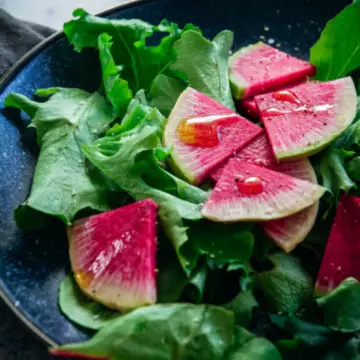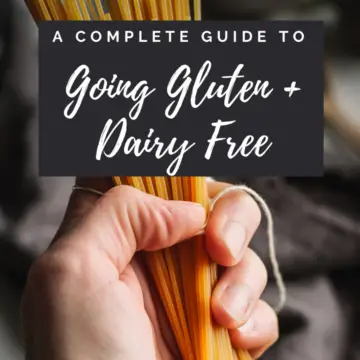In this post, you'll find out what foods trigger IBS-C and IBS-D and what you can do to minimize symptoms.

I've alluded to the fact that I have gut issues (surprise!), hence the inception of this blog. Working towards healing it is not a one time deal but rather a continual lifestyle and maintenance of a certain balance that allows me to essentially be pain free - more or less.
The current estimate is that between 25-45 million people in the US are suffering from Irritable Bowel Syndrome. A staggering number in my opinion. "Irritable bowel syndrome (IBS) is a common disorder that affects the large intestine (colon). Irritable bowel syndrome commonly causes cramping, abdominal pain, bloating, gas, diarrhea and constipation. IBS is a chronic condition that you will need to manage long term."
One of the unfortunate things about IBS is that it is a life sentence. But just because it's a life sentence does not mean that you have to be in pain your whole life. In this post I want to cover some of the symptoms of IBS and how to identify if you could be suffering from IBS-C/D or a combination (C standing for constipation and D for diarrhea) . So let's get really personal and talk about poop. Go ahead, get it out of your system. Good? Okay, let's move on...
IBS is generally used as an umbrella term, which could have a variety of underlying issues that may be at play. An important bit to remember is that IBS is not just a physical condition. It's a play between the psychological and physiological. I've never heard of a person with IBS who doesn't experience some sort of emotional issues, to varying degrees.
It's also important to note that while IBS occurs in both men and women, it's been shown that women tend to be affected much more so than men. So how do you know if you have IBS?
Physical and emotional symptoms of IBS
- Abdominal pain and cramping
- Bloating
- Gas
- Diarrhea or Constipation or a combination of both
- Mucus in stool
- Nausea
- Heartburn
- Anxiety
- Depression
- Metallic/bitter taste in the mouth
- Headaches
- Body image issues (more often than none due to the physical symptoms)
What are triggers of IBS?
- Stress:
This is a big component for those suffering from IBS. In my opinion, right up there with the foods we eat. Our perceived stress plays a big role on our gut function. The reason I wrote perceived is that stress is interpreted very differently by two people based on the same experience. "Stress, which is defined as an acute threat to homeostasis, shows both short- and long-term effects on the functions of the gastrointestinal tract. Exposure to stress results in alterations of the brain-gut interactions ("brain-gut axis") ultimately leading to the development of a broad array of gastrointestinal disorders including inflammatory bowel disease (IBD), irritable bowel syndrome (IBS) and other functional gastrointestinal diseases, food antigen-related adverse responses, peptic ulcer and gastroesophageal reflux disease (GERD)"
- Anxiety and Depression:
The prevalence of anxiety and depression is very high. There's been a good amount of research backing up the gut-brain connection and the brain's role in the gut and vice versa. What remains unclear is whether gut issues can actually trigger symptoms of anxiety and depression or whether anxiety and depression bring on gut issues. I think this will be a big area of research in the coming years. "Anxiety and depression symptomatology should be systematically checked and treated in IBS patients, as psychological factors are important moderators of symptom severity, symptom persistence, decisions to seek treatment, and response to treatment."
- Gluten:
A major trigger of IBS symptoms is gluten. Some of the symptoms experienced in people with IBS are similar to those who suffer from Celiac disease as well as NCGS (Non Celiac Gluten Sensitivity). "While the treatment of NCGS is exclusion of gluten from the diet, some, but not all, of the patients with IBS also improve on a gluten-free diet." Based on the findings in this study, patients with NCGS and IBS have similar symptoms when exposed to gluten." It is thus conceivable that ingestion of wheat containing ATIs, in the presence of intestinal inflammation enhances an innate immune response that plays a role in the generation of symptoms in patients with IBS, which then resolve when the patient takes up a gluten-free/wheat free diet.". The most common foods containing gluten, are bread, cereals, cakes, pasta, crackers, pretzels. The list is long and gluten can hide in a plethora of places. If you want additional resources and a more comprehensive overview of gluten specifically, check out this post.
- Dairy:
Similar to gluten, most people are not able to properly digest dairy. It seems to trigger a variety of symptoms in most of the population though not all are affected in the same way. "In humans, approximately 70% of the adult population has a decreased lactase activity[36]. In people with lactase deficiency, lactose is not hydrolyzed and absorbed in the small bowel, but passes through the gastrointestinal tract into the colon into where bacterial fermentation produces gas and short-chain fatty acids and other products that can cause luminal distension and induce GI symptoms" Most people with dairy sensitivity have a tendency to lean towards IBS-D. At least most of the time.
- Insoluble Fiber:
This one is tricky because fruits and vegetables are amazing but some people who suffer from IBS, may be particularly sensitive to Insoluble Fiber. Though before I get into this, I want to point out that those who are eating insoluble fiber foods may simultaneously be consuming gluten and dairy. Those are confounding factors which should not be ruled out. Only by starting an elimination diet would you be able to determine without much doubt, whether or not this causes symptoms or the other two triggers may be at play. Insoluble fiber foods include: whole grains, corn, beans, legumes, cabbage, onions, garlic, bell peppers, peas, etc. Here is a comprehensive list breaking down soluble and insoluble fiber content in foods. Again, these are triggers, but whether or not they are stand alone triggers, depends on each individual. Don't take anyone's word for it until you try it yourself.
- Artificial sweeteners:
Just because something says sugar free doesn't mean it's going to be any good for your body. Quite the opposite; your digestive tract works incredibly hard in order to be able to break down artificial sweeteners. Often times, consuming foods and beverages containing these chemicals, will trigger an immune response and therefore IBS symptoms. "Although AS are widely utilized in commercially available products, there is a remarkable paucity of medical literature addressing their effects on GI physiology and symptoms. The 2 main areas on which there is data to suggest that AS affect the GI tract include motility and the gut microbiome."
- Hormonal changes:
This does not apply to men as they are not affected by the hormonal changes women experience during a monthly cycle. There's increasing research that shows the connection between hormonal fluctuations and IBS symptoms. "Observations in women with IBS suggest that there may be links among GI symptoms, including abdominal pain, motility/transit, visceral sensitivity, and the ovarian hormone decline around menses"
- Greasy food:
Greasy, fried food should be no one's go to food, especially not if you're suffering from IBS. According to this study fatty food has shown to cause problems for some people suffering from IBS. "An important proportion of patients with IBS relate symptoms to foods rich in fat[8,25,26]. As a consequence, the avoidance of fatty foods is one of the most frequent dietary approaches considered by IBS patients for symptoms improvement[36]. Indeed, laboratory-based studies have shown that duodenal lipids inhibit small bowel motility and impair intestinal gas clearance, inducing gas retention and bloating". I would argue that healthy fat from grass fed meat, pastured eggs and wild caught fish may not have the same impact as greasy fast food cheeseburgers and fries. It's also important to consider if other major triggers such as gluten and dairy are combined with fatty foods.
Common foods triggering IBS-C symptoms
- Dairy
- Unripe bananas
- Caffeine
- Fried foods
- Gluten
- Refined flour
- Sugar
- White Rice
Common foods triggering IBS-D symptoms
- Caffeine
- Alcohol
- Dairy products
- Sugary foods
- Fatty, greasy foods
- Artificial sweeteners
What can you do?
You don't have to eliminate everything out of your life if you suffer from IBS. Though I do encourage at least trying an elimination diet if you think IBS may be an issue for you. With diet alone you don't necessarily need the supervision of a doctor, unless you feel you need it. The biggest difference for me has been eliminating gluten and dairy. It has changed my life.
- Make sure you increase fiber slowly: Your gut bugs will thank you. Getting adequate amounts of ferment-able fiber will ensure that things are properly moving and the good bacteria in your colon will thrive. But don't overdo it as fiber in some people may actually worsen symptoms, especially if you're increasing too quickly. The recommended intake is between 20-35 grams but experiment with what works for you.
- Cut out gluten: If you've been suffering for years like I have and couldn't quite put your finger of what's causing you constant distress, try getting rid of gluten for one week and see how you feel. If it doesn't make a difference, reintroduce it. No harm.
- Get rid of dairy: Same as with dairy, you could cut dairy out and reintroduce it. If you're deciding to couple dairy and gluten, cut both out for 1 week and then introduce one one week and the other the next. It may just make a big difference in how you feel. It certainly has for me.
- Manage your stress: I know, how obvious! But this is one of the most important things you can do if you suffer from IBS. Stress wreaks havoc on the gut. You may not even be aware of your stress level until you step back and look at your life. This post focuses on one powerful way you can manage stress through meditation.
- Don't forget about water: Drinking enough fluids during the day is crucial in order to maintain a healthy gut and minimize IBS symptoms. Dehydration can easily bring on symptoms, especially on the constipation side.
- Fresh herbs: Consuming fresh herbs can help soothe IBS symptoms. Making tea from fresh herbs, adding them to foods or smoothies can have a calming effect. If you're looking for a way to use herbs in a smoothie, try this recipe.
- Essential oils: Another good way to manage IBS symptoms is through essential oils. Research is getting behind essential oil use for IBS and you can read more about it in this study. "Many of the essential oils had antibacterial activity in the three assays, suggesting that they would be good candidates for testing in clinical trials. The observed antibacterial activity of ethanolic extracts of coriander, lemon balm and spearmint leaves suggests a mechanistic explanation for the efficacy of a mixture of coriander, lemon balm and mint extracts against IBS in a published clinical trial.
If you've tried some or all of these and find no relief, it's certainly worth having a conversation with a specialist who might be able to dig deeper into what's going on. Medication can be prescribed but I'm convinced that through food and lifestyle, we can cure most ailments.






Comments
No Comments